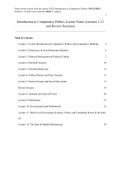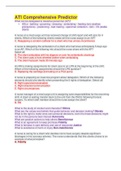College aantekeningen
Introduction to Comparative Politics Lecture Notes (Lectures 1-12 and Review Sessions) - GRADE 7,0
Notes on the lectures from the course (2022) Introduction to Comparative Politics. INCLUDES lectures 1-12 and review sessions (Total: 31 pages).
[Meer zien]





